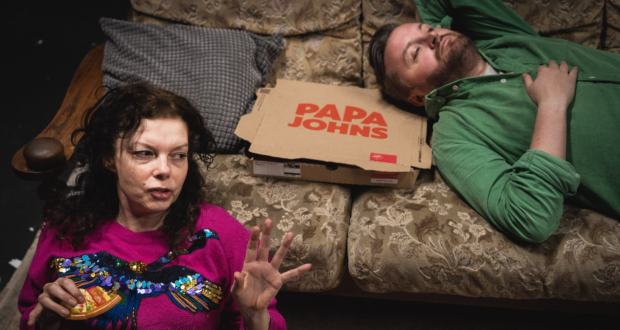A portrayal of the devastating effects of alcoholism and addiction, Happy Hour disappoints with its reliance on outdated comedy techniques and caricatures. Summary
Rating
Ok
Alcoholism is a terrible disease: it ruins lives and is very difficult to overcome. For comedy to work in a play about this it needs to be balanced with honesty, reality and dignity. Sadly, balance is lacking in Happy Hour and the result is reminiscent of a 1970s farce complete with misogynist jokes and pantomime choreography.
The play opens with Jacqui (Stacha Hicks) face down on her sofa, fully clothed, having not made it to bed the night before. Her adult daughter Rose (Ellie Philpott) is horrified to discover her suffering the effects of a drunken night out again. Jacqui has forgotten her granddaughter’s birthday, is not clear how old she is, and is absent from family drawings completed by the child. Upset and determined to right her wrongs, she promises to babysit that night. Rose is sceptical but desperate for her mum to take the right path.
Once Rose leaves, Jacqui turns to George (Derek Murphy) a physical manifestation of her alter-ego and fellow drinker. An hallucination (not unheard of in chronic alcohol abuse), only Jacqui can see him. As a device this is inspired: George is able to articulate the appeal of the drink, the freedom and glamour it offers, alongside the concerns that Jacqui will be boring and lonely without it. He is also able to fill in the blanks from her memory for the benefit of the audience. Why is this manifestation male though? It feels reductive to assume that the powerful and disruptive force in a personality has to be male. Particularly when the protagonist is clearly female.
What then follows is a mock comedic sketch which is more than a little juvenile and sexist. Jacqui dances as a drunk and mimes to ‘The Stripper’ music before the lure of scrumpy proves irresistible and they head to the pub again, abandoning all thoughts of babysitting and a dry night. This scene is repeated several times with minimal variation. Without going into detail it is not my experience that drunken women strip off and dance luridly, offering ‘favours’ to taxi drivers to cover the fare. They are more likely to become maudlin, call old lovers, fall over and black out. Subtlety is much needed.
Relief is provided when Jacqui articulates the lure of the drink and the freedom and glamour it offered her when she was young. She reveals the toll it has taken on her personal and professional life, and the alcoholism in her family. An important contrast, this spotlights the implications of this level of addiction and offers a poignant and much needed balance to the slapstick. It is over quickly.
Staging is provided in the form of a sparse living room, which is fine if uninspired. Male comedians are heard making jokes about drunks over a tannoy and whist I understand this reminds us of Jacqui’s comfort in a pub and the part that humour plays in normalising drunken behaviour in society, to say it is outdated and painful is an understatement.
Despite the limitations of the script all actors perform well, and in particular Philpott, in her professional debut, delivers an accomplished and realistic portrayal of the conflicting emotions Jacqui’s daughter would experience.
This script needs a rethink in terms of content, length and nuance. Addiction and recovery are shocking and traumatic: an audience will understand that without excessive repetition. If humour is used well, it creates poignancy and empathy. If over-used, characters become caricatures and opportunities for reflection are lost.
Written by: Andy Walker
Directed by: Lesley Manning
Produced by: Jamie Ryecroft
Happy Hour plays at Upstairs at the Gatehouse until 28 May. Further information and bookings can be found here.
 Everything Theatre Reviews, interviews and news for theatre lovers, London and beyond
Everything Theatre Reviews, interviews and news for theatre lovers, London and beyond



